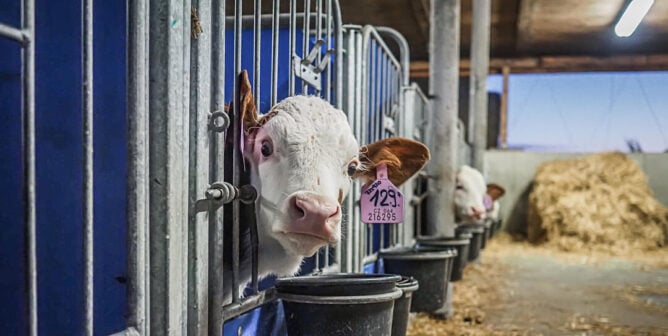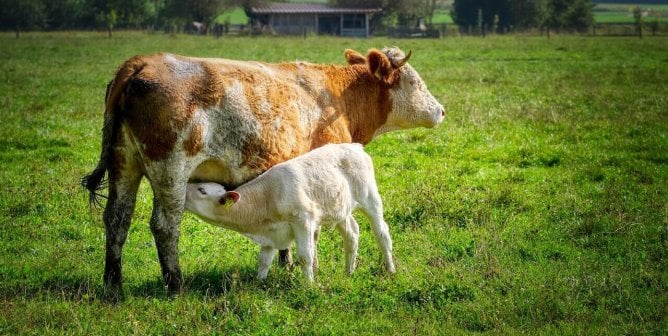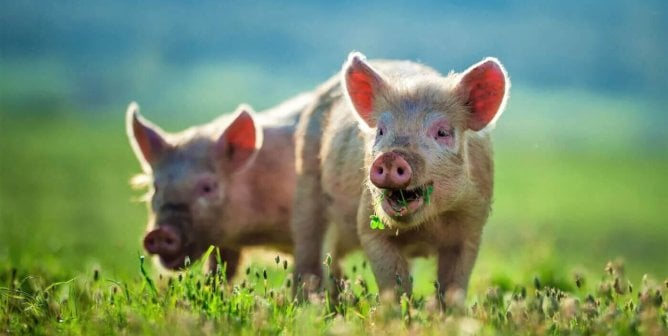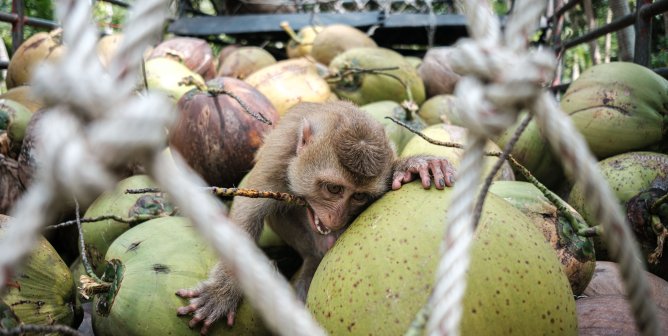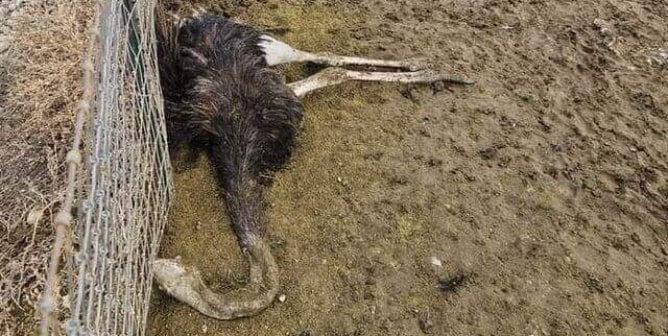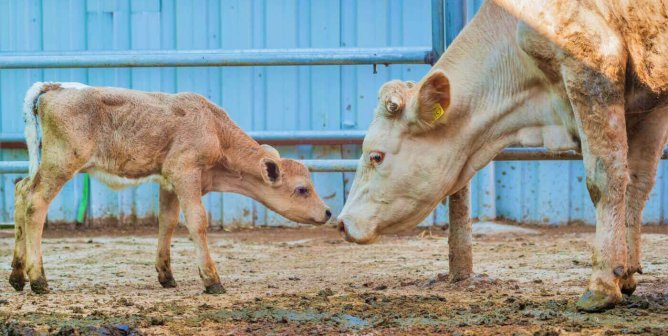Being Vegan: Healthy and Humane
Being vegan is as good for humans’ health as it is for animal welfare. There is no nutritional need for humans to eat any animal product; all our dietary needs, even as infants and children, are best supplied by a meatless diet. The Academy of Nutrition and Dietetics notes that a vegetarian diet reduces the risk of many chronic degenerative diseases and conditions, including heart disease, cancer, obesity, hypertension, and diabetes.1
Animal Products Lead to Heart Disease and Cancer
Cardiovascular disease is the number one health problem in the U.S., accounting for nearly 1 million heart attacks annually and 2,300 deaths each day.2 Because we now know what causes heart attacks, we can prevent them. In many studies, researchers have found that higher levels of cholesterol are linked to a greater risk of having a heart attack. For every 1 percent reduction in your LDL cholesterol level, your risk of coronary heart disease drops by 1 percent.3
Thanks to the dedicated efforts of the meat, dairy, and egg industries, many Americans still believe that animal products are necessary for good health. One of the largest studies on lifestyle and health found that the chances of dying from cardiovascular disease was significantly less for vegans than non-vegans, especially men.4 Plant foods contain no cholesterol, whereas meat, eggs, and dairy products contain large amounts of cholesterol and saturated fat. Also, the high fiber content of a vegan diet (meat, dairy products, and eggs are devoid of fiber) helps “wash away” excess cholesterol in your digestive tract. A vegan diet can even reverse damage already done. When Dr. Dean Ornish put patients with coronary artery disease on a low-fat vegan diet combined with moderate exercise and relaxation techniques, he found that they reversed the buildup of plaque in their arteries.5
One of the primary recommendation in the American Cancer Society’s (ACS) Guidelines on Nutrition for Cancer Prevention is to eat a diet “with an emphasis on plant food.”6 Researchers have found that vegetarians are up to 50 percent less likely to suffer from some cancers.7
Meat Can Be Poisonous
In addition to causing heart disease and cancer, animal products contain harmful contaminants—including bacteria, arsenic, dioxins, and mercury—that can affect our health both in the short and long terms.
Every year in the U.S., there are 48 million cases of food poisoning, and 3,000 of these cases are fatal.8 The overuse of antibiotics on factory farms has caused many of the bacteria found on animal flesh to become antibiotic-resistant. Consumer Reports found that more than half of chickens studied were infected with E. coli and almost half tested positive for at least one multidrug-resistant bacterium.9 Of the billions eggs taken from chickens every year, more than 2 million are estimated to be contaminated with salmonella and, as the Centers for Disease Control and Prevention cautions, “One contaminated egg can contaminate an entire batch of pooled eggs. Everyone who eats eggs from that batch is at risk for illness.”10
Fish flesh is also not a healthy food. Polychlorinated biphenyls (PCBs), residual industrial compounds that can be found in the environment, have caused cancer in animals and skin problems and liver damage in humans.11 Fish flesh has been found to harbor levels of PCBs thousands of times higher than those in the water in which they live.12 Fish also accumulate methylmercury in their bodies, and pregnant women and children have been cautioned not to eat fish that may contain high levels of this toxic substance.13
Factory Farming Hurts Animals
Animals are much more intelligent and complex than most people realize, and scientists are providing more and more evidence of this all the time.
According to researchers, cows enjoy mental challenges and get excited when they use their intellect to overcome an obstacle. Dr. Donald Broom, a professor at Cambridge University, says that when cows figure out a solution to a problem, “The brainwaves showed their excitement; their heartbeat went up and some even jumped into the air. We called it their Eureka moment.”14 Scientists now know that pigs have the cognitive skills of 3-year-old human children.15 Biologists wrote in Fish and Fisheries that fish are “steeped in social intelligence, pursuing Machiavellian strategies of manipulation, punishment and reconciliation, exhibiting stable cultural traditions, and cooperating to inspect predators and catch food.”16 Chickens form friendships and social hierarchies, recognize one another, develop a pecking order, and even have cultural knowledge that is passed between generations.17
Nearly all the animals raised for food in America today spend their lives on factory farms. These animals, who feel pain and fear just as the dogs and cats who share our homes do, are separated from their families and crammed by the thousands into filthy warehouses. They are mutilated without the use of painkillers and deprived of everything that is natural and important to them—they won’t be permitted to see the sun or breathe fresh air until the day when they are forced onto trucks bound for the slaughterhouse. On the killing floor, many animals are completely conscious and struggling to escape while their throats are cut—and some are still conscious while their bodies are hacked apart or when they are dunked into tanks of scalding-hot water.
Factory Farming Hurts Our Planet
Raising animals for food requires massive amounts of resources. Two-thirds of all agricultural land in the U.S. is used to raise animals for food or to grow grain to feed them.18 Chickens, pigs, cattle, and other animals raised for food are the primary consumers of water in the U.S.: A single pig consumes 21 gallons of drinking water per day, while a cow on a dairy farm drinks as much as 50 gallons daily.19,20
Each day, factory farms produce billions of pounds of manure, which ends up in lakes, rivers, and drinking water. Each farmed pig produces about 10 pounds of manure per day.21 As a result, many tons of waste end up in giant pits, polluting the air and groundwater. According to the Environmental Protection Agency, agricultural runoff is the number one source of pollution in our waterways.22 For more on how switching to a vegan diet reduces your “ecological footprint,” please see our factsheet on Vegetarianism and the Environment.
What You Can Do
With so many great vegan options, eating green has never been more delicious. Whether you go vegan for the environment, for your health, or for animals, you have the power to change the world, simply by changing what’s on your plate.
• Include high-fiber foods in your diet. Whole-wheat bread, brown rice, oats, flax seeds, and vegetables supply fiber, which helps lower cholesterol.
• Avoid dairy products; they contain cholesterol and saturated fats. Calcium can be obtained from beans, broccoli, sesame seeds, and green, leafy vegetables.
• Visit PETA.org for delicious eggless, nondairy vegan recipes.
• Visit PETA.org for our free vegan starter kit.
References
1V. Melina et al., “Position of the Academy of Nutrition and Dietetics: Vegetarian Diets,” Journal of the Academy of Nutrition and Dietetics 116(2016): 1970-1980.
2American Heart Association, “Heart Disease and Stroke Statistics—2018 Update: A Report From the American Heart Association,” Circulation 127(2018): 137:e67–e492.
3J.C. LaRosa, “Low-Density Lipoprotein Cholesterol Reduction: The End Is More Important Than The Means,” American Journal of Cardiology 100(2007): 240-2.
4Dr. Michael J. Orlich et al., “Vegetarian Dietary Patterns and Mortality in Adventist Health Study 2,” Journal of the American Medical Association Internal Medicine 173(2013): 1230-1238.
5Dean Ornish et al., “Intensive Lifestyle Changes for Reversal of Coronary Heart Disease” JAMA 280(1998): 2001-2007.
6Lawrence H. Kushi et al., “American Cancer Society Guidelines on Nutrition and Physical Activity for Cancer Prevention: Reducing the Risk of Cancer With Healthy Food Choices and Physical Activity,” CA Cancer Journal for Clinicians 62 (2012): 30-67.
7Paul L. Appleby et al., “Mortality in Vegetarians and Comparable Nonvegetarians in the United Kingdom,” The American Journal of Clinical Nutrition 103(2016): 218-230.
8United States Food and Drug Administration, “Foodborne Illnesses: What You Need To Know,” 5 Sept. 2018.
9“Dangerous Contaminated Chicken, ” Consumer Reports, Jan. 2014.
10Centers for Disease Control and Prevention, National Center for Emerging and Zoonotic Infectious Diseases, “Salmonella serotype Enteritidis,” 23 Nov. 2010.
11U.S. Department of Health and Human Services, “ToxFAQs for Polychlorinated Biphenlys (PCBs),” Agency for Toxic Substances and Disease Registry, Jul. 2014.
12Agency for Toxic Substances and Disease Registry.
13Food and Drug Administration, “Eating Fish: What Pregnant Women and
Parents Should Know,” U.S. Department of Health and Human Services and U.S. Environmental Protection Agency, Jan. 2017.
14Jonathan Leake, “Cows Hold Grudges, Say Scientists,” The Australian 28 Feb. 2005.
15“New Slant on Chump Chops,” Cambridge Daily News 29 Mar. 2002.
16“Scientists Highlight Fish ‘Intelligence,’” BBC News, 31 Aug. 2003.
17Valerie Elliott, “Why Did the Chicken Cross the Road,” Times Online 18 Mar. 2005.
18Daniel P. Bigelow and Allison Borchers et al., “Major Uses of Land in the United States, 2012,” Economic Information Bulletin No. (EIB-178), U.S. Department of Agriculture, 14 Aug. 2017.
19Theo van Kempen, “Whole Farm Water Use,” North Carolina State University Swine Extension, Jul. 2003.
20Craig Thomas, “Drinking Water for Dairy Cattle, Part 1,” Michigan State University Extension, 5 Apr. 2011.
21Beth Hoffman, “What The Pork? China, Pigs And Poop,” Forbes, 13 May 2014.
22Environmental Protection Agency, “Nonpoint Source: Agriculture,” Polluted Runoff: Nonpoint Source (NPS) Pollution, 18 Aug. 2017.

